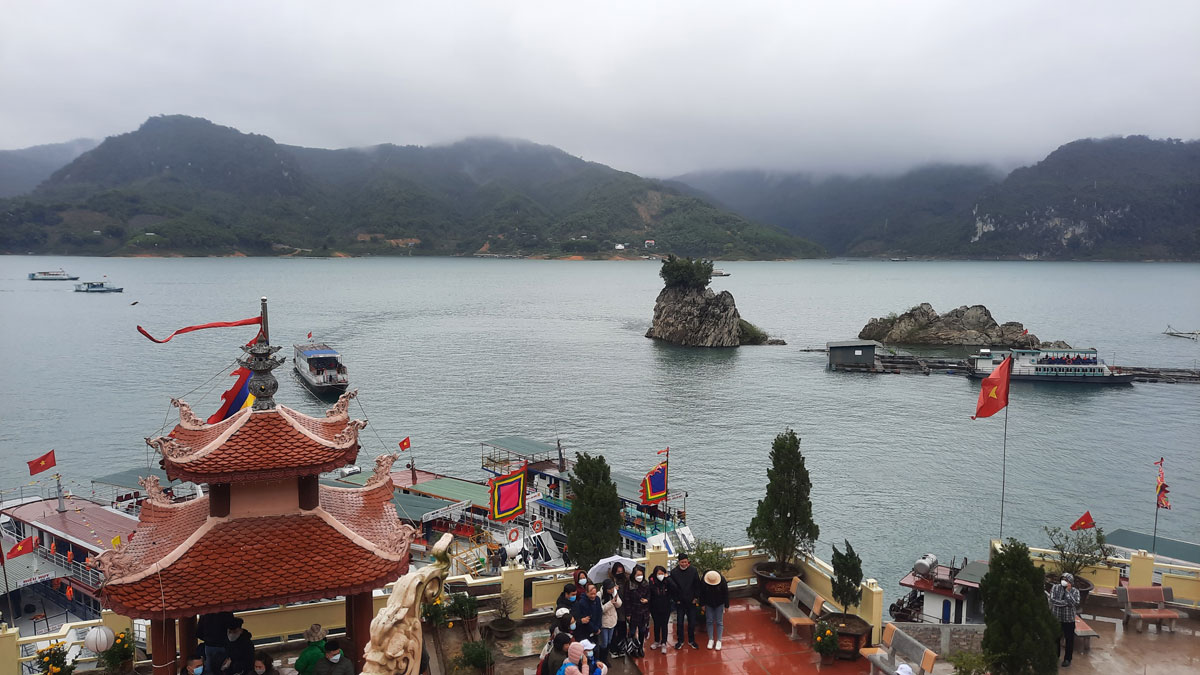
(HBO) – The development of a master plan of Hoa Binh province for 2021-2026, with a vision to 2050 is considered one of the four strategic breakthroughs in the realization of the 17th provincial Party Congress’s Resolution. While it is an urgent task, the quality of planning must be ensured in accordance with the new Law on Planning, thereby creating motivations to attract investment resources for sustainable development.

The master plan defines the development of
tourism on Hoa Binh Lake in association with sustainable environmental
protection.
On April 2, 2021, the province decided to establish a
steering committee for building the master plan of the province led by the
Secretary of the provincial Party Committee. The process is divided into five
phases, with phase one focusing on data collection and assessment of current
situation and phase two on developing the draft master plan. In phase three,
the draft will be put on table, and then be revised in phase four. Finally, it
will be submitted to the Prime Minister for approval in accordance with Article
35 of the Law on Planning. The province has basically completed the second
phase.
There are difficulties during the planning
making process because the national and regional master plans have not yet been
approved. The lack of information and orientations is also a problem.
To improve the quality of the planning work and
ensure that it is in conformity with provisions of the laws, the provincial
steering committee asked relevant agencies and People's Committees of districts
and cities to raise their responsibilities and provide detailed and accurate
data for the consulting unit.
It is necessary for tourism planning to reflect
the province's advantages in terms of location, environment and culture.
Attention should be paid to Hoa Binh lake as well as strategic tourism areas
such as Kim Boi and Yen Thuy hot springs in association with homestay and other
outdoor activities including trekking.
Hoa Binh has set a target of becoming a luxury
resort destination in the region. However, the development of the tourism
industry will be attached to environmental protection, development of
transport, electricity, clean water supply, telecommunications systems,
high-quality human resources as well schools, hospitals, commercial centers,
and amusement parks.
As for industrial planning, an area specializing
in furniture materials should be established to attract high quality human
resources from the capital city of Hanoi.
Regarding investment attraction, the focus
should be on projects that prove to be effective, generate jobs,
andcontributed to State Budget while preserving environmental
sustainability.
The province is planned to be an area that
provides green agricultural products at affordable prices, processing
high-quality farm produce to Hanoi. Attention will be paid to high-tech
agriculture, protecting the environment and growing medicinal plants under the
forest canopy.
The provincial Department of Planning and
Investment is assigned to coordinate with relevant agencies and units to
complete the planning and submit it to the Prime Minister by August 31, 2022./.
Hoa Binh province is undergoing a dynamic transformation amid Vietnam’s national digital transition. Building on Poliburo’s Resolution No. 57-NQ/TW on breakthroughs in science, technology, innovation, and national digital transformation, the province has rolled out a wide range of practical action plans. A standout initiative is the "Digital Literacy for All” movement, an effort to ensure that no one is left behind in the digital era.
Hoa Binh province is undergoing a dynamic transformation in the wake of the national digital transformation movement. Building on Resolution No. 57-NQ/TW of the Politburo on breakthroughs in science, technology, innovation, and national digital transformation, the province has implemented a wide range of practical action plans. A standout initiative is the "Digital Literacy for All” movement ambitious effort to ensure that no one is left behind in the digital age.
With a spirit of unity and proactive problem-solving, the Party Committee, the government and the people of Dong Lai Commune (Tan Lac District) have made great strides in implementing the resolutions of the 24th Party Congress of the commune for the 2020 - 2025 term. Focusing on leadership and practical actions, the commune has brought the Party’s resolutions into daily life, creating strong impacts and pushing the local development forward.
Amid the nationwide push for digital transformation, young people in Hoa Binh Province are stepping up as dynamic pioneers, applying technology to enhance Youth Union operations and expand the reach of youth-led initiatives. Through creativity and adaptability, Youth Union organizations at all levels have introduced a series of practical solutions, contributing to modern governance and community development.
In recent years, An Nghia commune, located in Lac Son district, has stepped up administrative reform, focusing on improving the quality and efficiency of its single-window service unit for receiving and processing administrative procedures. These improvements have helped create favourable conditions for local residents and organisations to handle administrative procedures, contributing to the commune’s broader socio-economic development.
The Prime Minister-approved master plan to develop the multi-use value of forests ecosystems through 2030, with a vision to 2050, aims to improve the management and sustainable use of forest resources, create jobs, increase incomes, and improve the living standards of ethnic minorities, people in mountainous and remote areas, forest workers and those living near forests.



